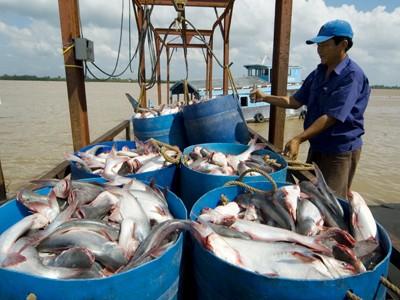Chance to rebuild tra fish image comes up

HCMC - Tra fish exporters are having trouble in the European Union market given an export decline but industry insiders believe this is an opportunity to rebuild the image of the industry through sustainable farming, cost reduction, and production aligned to market demand.
The above remark was given at a review meeting on the Sustainable Pangasius Supply Chain (SUPA) project in HCMC on March 29.
The EU is a demanding market with strict environmental requirements for sustainable development of everyday consumer products such as seafood. That is why the export of tra fish to this market has been tumbling since negative news about tra fish in Vietnam emerged in the EU media, said experts.
Therefore, to win back its EU market, tra fish has no other way but to take the path of sustainable farming, and efficient use of resources like water and power.
Le Xuan Thinh, SUPA project coordinator, said the greatest challenges for the tra production chain were high feed costs, low fish survival rates, and high water and energy consumption.
The existence of too many intermediaries pushes up costs while businesses experience a lot of hardships with certificates.
Therefore, the SUPA project focuses on these issues. The project has helped enterprises develop 20 new products mainly from by-products, thereby improving their quality to meet market demand.
Also, thanks to the project, businesses are able to slash power consumption by 18-20% and water use by 26-30%, thereby lowering the production cost of each processing plant by VND2-5 billion.
This is why Hoang Thanh, a representative of the EU delegation in Vietnam, commented that the SUPA project was assessed by the EU as one of the comprehensive projects.
Tran Dinh Luan, deputy general director of the Vietnam Directorate of Fisheries, ascribed the flimsy price of tra fish in the past to the lack of sustainability in the development of the industry. Therefore, Vietnam is planning production restructuring towards sustainability, cost efficiency, and alignment of production to market demand.
To restructure the tra fish industry, the Directorate of Fisheries has many projects that help businesses add value to their products and expand consumption markets.
One of the unsustainable factors of the tra fish supply chain is that fish fillets make up the majority of products, with low added value. The Ministry of Agriculture and Rural Development has signed Decision 655/QD-BNN-TCTS, according to which nearly VND165 billion will be spent on reorganizing the fisheries sector, including tra fish, from 2017-2020.
The SUPA project is supported by the EU via the EU SWITCH-Asia program for a four-year period from April 2013 to March 2017, with tra fish production and processing units in the Mekong Delta as beneficiaries.
Four organizations involved in the SUPA project are Vietnam Cleaner Production Center, Vietnam Association of Seafood Exporters and Producers, and WWF Vietnam and WWF Austria. The purpose of this project is to help the tra fish industry of Vietnam achieve sustainable production, meeting the standards and demands of the market, especially of EU countries.
Có thể bạn quan tâm
 EU-bound tra fish export poised to decline further
EU-bound tra fish export poised to decline further Vietnam’s exports of tra fish to the EU are forecast to continue declining sharply this year, but shipments to China are on the rise
 Ca Mau suitable for organic shrimp farming
Ca Mau suitable for organic shrimp farming HCMC - Ca Mau, with its vast mangrove forest, is in a good position to adopt the organic shrimp farming model to bring higher economic value to farmers
 EU supports Vietnam to build sustainable pangasius supply chain
EU supports Vietnam to build sustainable pangasius supply chain The Vietnam Association of Seafood Exporters and Producers (VASEP) coordinated with its partners to review a project establishing a sustainable Tra fish